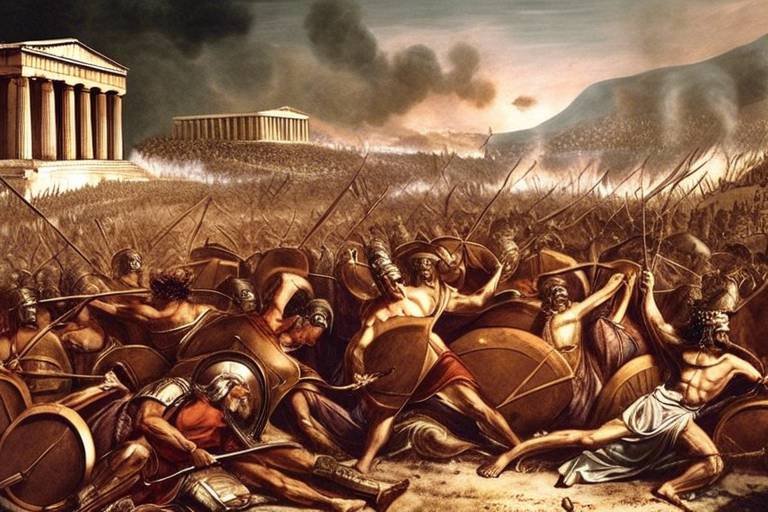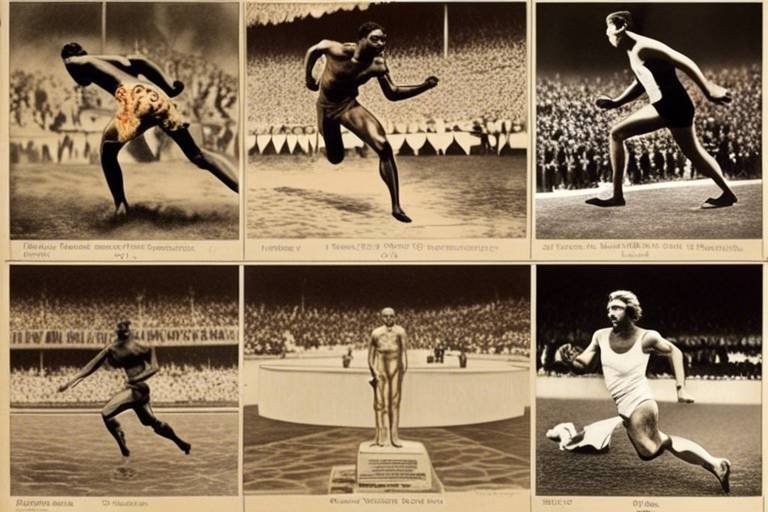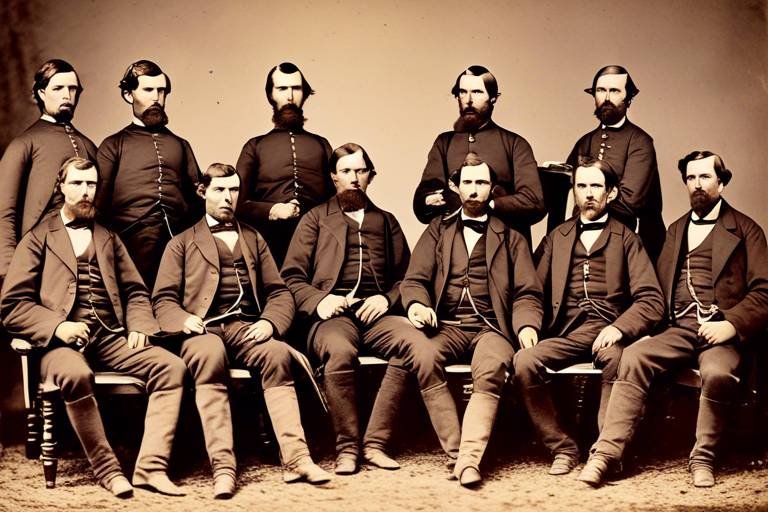The Causes of the Haitian Revolution
Exploring the factors that led to the Haitian Revolution, a pivotal event in history that resulted in the first successful slave rebellion leading to the establishment of Haiti as the first independent black republic in the Americas.
The Haitian Revolution was ignited by a combination of various factors that culminated in a powerful uprising against the oppressive colonial regime. One of the primary catalysts for the revolution was the French Colonial Oppression. The brutal treatment of slaves, discriminatory laws, and economic exploitation by the French rulers created a powder keg of discontent among the Haitian population, setting the stage for rebellion.
Furthermore, the Enlightenment Ideas that swept through Europe also played a crucial role in fueling the revolutionary spirit in Haiti. The principles of liberty, equality, and fraternity inspired Haitian revolutionaries to challenge the existing social hierarchy and demand their rights, laying the foundation for a movement of resistance.
Slave uprisings, such as the one led by Toussaint Louverture in 1791, showcased the unwavering determination of the enslaved population to fight for their freedom. These acts of defiance demonstrated that the enslaved were not willing to accept their subjugation, sparking a chain of events that ultimately led to the Haitian Revolution.
The Impact of the French Revolution cannot be understated in its influence on the Haitian population. The revolutionary ideals of liberty and equality that emerged from France resonated with the Haitians, providing them with a framework for their own struggle against colonial oppression and contributing to the fervor of the revolution.
In addition to ideological factors, Economic Injustice played a significant role in driving the desire for change in Haiti. The exploitative economic system, characterized by harsh working conditions and unequal wealth distribution, created deep-seated grievances among the population, fueling their resolve to overthrow the oppressive regime.
The emergence of a Mulatto Elite and a class of Free People of Color added complexity to the social dynamics leading up to the revolution. These groups, aspiring to greater political rights and social status, further intensified the tensions within Haitian society, contributing to the revolutionary atmosphere.
Moreover, International Influences played a role in shaping the course of the Haitian Revolution. The ripple effects of neighboring revolutions in the Caribbean and the Americas, along with diplomatic relations with foreign powers, influenced the trajectory of the revolution and contributed to its eventual success.
The legacy of the Haitian Revolution is profound, as it not only led to the abolition of slavery in Haiti but also inspired liberation movements worldwide. The revolution stands as a testament to the resilience and determination of the Haitian people, serving as a beacon of hope for all those fighting against oppression and injustice.

French Colonial Oppression
Exploring the factors that led to the Haitian Revolution, a pivotal event in history that resulted in the first successful slave rebellion leading to the establishment of Haiti as the first independent black republic in the Americas.
The French colonial rule in Haiti was marked by severe oppression and cruelty towards the enslaved population. The policies enforced by the French authorities were designed to maintain control and exploit the resources of the colony, leading to widespread discontent and resistance.
Slaves in Haiti endured unimaginable hardships, facing brutal treatment, harsh working conditions, and constant abuse at the hands of their masters. The discriminatory laws imposed by the colonial regime further dehumanized the enslaved individuals, stripping them of their basic rights and dignity.
Moreover, the economic exploitation of Haiti by the French, which prioritized profit over the well-being of the local population, exacerbated the suffering of the slaves. The unequal distribution of wealth and resources perpetuated a cycle of poverty and deprivation among the enslaved individuals, fueling their desire for liberation.
The oppressive nature of French colonial rule created a powder keg of resentment and resistance among the Haitian population. The systematic dehumanization and degradation of the enslaved individuals laid the foundation for a revolution that would ultimately shatter the chains of slavery and pave the way for freedom.

Enlightenment Ideas
Exploring the factors that led to the Haitian Revolution, a pivotal event in history that resulted in the first successful slave rebellion leading to the establishment of Haiti as the first independent black republic in the Americas.
The Enlightenment era brought forth powerful ideas that would shape the course of history, igniting the flames of revolution in the hearts of the Haitian people. Concepts such as liberty, equality, and fraternity were not mere words but beacons of hope, guiding the oppressed towards a brighter future.
The Enlightenment thinkers like Voltaire, Rousseau, and Montesquieu, though miles away in Europe, their words echoed across oceans, inspiring the Haitian revolutionaries to challenge the status quo. The notion that all men are born free and equal resonated deeply with those suffering under the yoke of slavery.
Imagine a spark in the darkness, a flicker of light in the depths of despair. The Enlightenment ideas were like a ray of sunshine breaking through the storm clouds, giving the Haitian people the courage to stand up against their oppressors and demand their inherent rights.
As the winds of change swept through the Caribbean island, the Enlightenment ideals acted as a compass, guiding the revolutionaries towards their ultimate goal of freedom and self-determination. The intellectual awakening fueled by these ideas became the driving force behind the Haitian Revolution, propelling the enslaved population towards a future they dared to dream of.
Enlightenment ideas were not just abstract concepts; they were the fuel that powered the flames of revolution, turning a spark into a blazing fire of liberation. The legacy of the Enlightenment lives on in the annals of history, forever intertwined with the story of the Haitian Revolution and the triumph of the human spirit over tyranny.

Slave Uprisings
Exploring the factors that led to the Haitian Revolution, a pivotal event in history that resulted in the first successful slave rebellion leading to the establishment of Haiti as the first independent black republic in the Americas.
Slave uprisings were a crucial element in the lead-up to the Haitian Revolution. These acts of resistance were not isolated incidents but rather a series of organized rebellions that showcased the enslaved population's unwavering determination for freedom.
One of the most notable uprisings was the 1791 rebellion led by Toussaint Louverture, a key figure in the Haitian Revolution. This uprising marked a turning point in the fight against slavery and colonial oppression, inspiring others to join the cause and stand up against their oppressors.
The slave uprisings were not only about physical rebellion but also about reclaiming dignity and humanity. Enslaved individuals, through their acts of defiance, challenged the dehumanizing institution of slavery and asserted their right to freedom and self-determination.
These uprisings were not without risks and sacrifices. Enslaved individuals faced severe consequences for their actions, including brutal reprisals and harsh punishments. Despite these dangers, they continued to resist, fueled by a deep desire for liberation and justice.
The slave uprisings served as a powerful catalyst for the Haitian Revolution, igniting a spirit of rebellion that would eventually lead to the overthrow of colonial rule and the establishment of Haiti as an independent nation. The courage and resilience of those who participated in these uprisings continue to inspire generations to fight against oppression and injustice.
If you have any questions or queries regarding the causes and impact of the Haitian Revolution, refer to the following frequently asked questions:
- What were the main factors that led to the Haitian Revolution?
- How did slave uprisings contribute to the momentum of the revolution?
- What role did Toussaint Louverture play in the Haitian Revolution?
- How did international influences shape the outcome of the revolution?
- What was the legacy of the Haitian Revolution on a global scale?

Impact of the French Revolution
The French Revolution, with its fervor for liberty, equality, and fraternity, cast a profound influence on the course of the Haitian Revolution. The revolutionary ideals that swept across France in the late 18th century resonated with the Haitian population, igniting a spark of defiance against the oppressive colonial rule. The principles of the French Revolution, which advocated for the rights of the common people and the overthrow of tyrannical regimes, provided a powerful ideological framework for the enslaved Haitians to challenge the status quo.
Moreover, the French Revolution's emphasis on universal rights and the abolition of feudal privileges inspired Haitian revolutionaries to envision a society free from the shackles of slavery and inequality. The echoes of the French Revolution reverberated across the Atlantic, reaching the shores of Haiti and fueling the flames of rebellion against the entrenched colonial powers.
As the Haitian Revolution unfolded, the ideals of liberty and equality championed by the French Revolution served as a guiding light for the enslaved population in their struggle for emancipation. The spirit of revolution that swept through France found a parallel in Haiti, where the oppressed masses rose up against their oppressors, drawing strength from the revolutionary fervor that had engulfed Europe.
The impact of the French Revolution on the Haitian Revolution cannot be overstated, as it not only provided a philosophical basis for the fight against colonial oppression but also galvanized the Haitian people to demand their rights and assert their humanity in the face of dehumanizing bondage. The legacy of the French Revolution lived on in Haiti, where the flames of liberty and equality were kindled anew, paving the way for the birth of the first independent black republic in the Americas.

Economic Injustice
Exploring the factors that led to the Haitian Revolution, a pivotal event in history that resulted in the first successful slave rebellion leading to the establishment of Haiti as the first independent black republic in the Americas.
Amidst the lush landscapes of Haiti, a dark shadow loomed over the fields where the enslaved toiled under the scorching sun. The economic system in place was not just a means of production but a mechanism of cruelty and exploitation. Slaves endured brutal working conditions, where their sweat and blood were the currency of profit for the plantation owners. The wealth generated from their labor did not trickle down to them; instead, it flowed into the coffers of the oppressors, widening the chasm of inequality.
Imagine a society where the scales of justice were tipped heavily against the most vulnerable, where the promise of a better life was nothing but a distant dream for those trapped in the cycle of poverty and despair. The lack of opportunities for social mobility further entrenched the divide between the haves and the have-nots, breeding resentment and discontent among the oppressed masses.
The economic injustice in Haiti was not just a matter of numbers on a ledger; it was a stark reality that defined the daily lives of the enslaved population. They were not seen as human beings with inherent rights but as mere instruments of labor, disposable commodities in the pursuit of profit. The unequal distribution of wealth created a powder keg of grievances waiting to explode, fueling the flames of rebellion that would eventually engulf the island in the fires of revolution.
Stay tuned for answers to commonly asked questions about the Haitian Revolution and its enduring impact on history.

Mulatto Elite and Free People of Color
The emergence of a mixed-race elite and a class of free people of color in Haiti played a significant role in the lead-up to the Haitian Revolution. The term "mulatto" referred to individuals of mixed African and European descent, often occupying a unique social position in society. These individuals, along with free people of color, faced discrimination and limited rights under the colonial regime, despite their relatively privileged status compared to enslaved Africans.
The mulatto elite, due to their mixed heritage and sometimes European education, aspired to greater political rights and social status within Haitian society. They sought to challenge the existing social hierarchy and gain more influence in political and economic spheres. Their presence added complexity to the dynamics of the revolution, as they navigated between their aspirations for equality and the realities of racial discrimination.
Free people of color, who were not enslaved but still faced restrictions on their freedom and opportunities, also played a crucial role in the revolutionary movement. They contributed to the intellectual and organizational aspects of the rebellion, advocating for greater rights and representation for people of color in a society dominated by white colonizers.
The tensions between the mulatto elite, free people of color, and the enslaved population further fueled the desire for change and contributed to the broader social upheaval that culminated in the Haitian Revolution. Their participation in the struggle for independence highlighted the diverse range of voices and experiences within Haitian society, challenging traditional power structures and paving the way for a more inclusive and egalitarian future.

International Influences
When examining the causes of the Haitian Revolution, it is crucial to consider the impact of international influences on shaping the course of events. The neighboring revolutions in the Caribbean and the Americas, such as the American Revolution and the Latin American wars of independence, provided both inspiration and strategic support to the Haitian revolutionaries. These movements created a ripple effect of defiance against colonial powers, fostering a sense of solidarity among oppressed peoples.
Furthermore, diplomatic relations with foreign powers played a significant role in the Haitian Revolution. The political maneuvering and alliances formed by Haitian leaders with countries like the United States and Britain not only provided military assistance but also legitimized Haiti's struggle for independence on the world stage. These international connections helped to bolster the Haitian cause and weaken the resolve of the French colonial forces.
The global context of the late 18th and early 19th centuries, characterized by shifting power dynamics and the spread of revolutionary fervor, created a favorable environment for the Haitian Revolution to succeed. The interconnectedness of nations and the exchange of ideas across borders contributed to the momentum of liberation movements worldwide, with Haiti emerging as a beacon of hope for those fighting against oppression.

Legacy of the Haitian Revolution
The Haitian Revolution, a monumental event in history, left a lasting legacy that reverberates through time. Its impact extended far beyond the borders of Haiti, shaping the course of global history and inspiring movements for freedom and equality around the world. The legacy of the Haitian Revolution can be seen in various aspects:
1. Abolition of Slavery: One of the most significant outcomes of the Haitian Revolution was the abolition of slavery in Haiti. The enslaved population's successful rebellion against their oppressors not only secured their freedom but also set a powerful example for enslaved people everywhere, fueling abolitionist movements worldwide.
2. Inspiration for Liberation Movements: The Haitian Revolution inspired liberation movements in other parts of the world, serving as a beacon of hope for those fighting against colonialism, slavery, and oppression. Leaders and activists looked to the Haitian Revolution as a model of resistance and resilience in the face of adversity.
3. Symbol of Resistance: The Haitian Revolution stands as a symbol of resistance against injustice and oppression. It symbolizes the power of the marginalized and oppressed to rise up against their oppressors and fight for their rights and dignity. The courage and determination of the Haitian revolutionaries continue to inspire those struggling for justice today.
4. Challenging the Institution of Slavery: By successfully overthrowing the system of slavery in Haiti, the revolution challenged the very foundation of the institution of slavery. It demonstrated that enslaved people were not powerless and could organize and fight for their freedom, sparking debates and actions against slavery globally.
5. Impact on International Relations: The Haitian Revolution had a significant impact on international relations, as it challenged the existing colonial powers and inspired movements for independence and self-determination in other colonies. It reshaped diplomatic relations and influenced the course of history in the Americas and beyond.
In conclusion, the legacy of the Haitian Revolution is profound and far-reaching, leaving an indelible mark on the history of liberation struggles and resistance movements. Its lessons continue to resonate today, reminding us of the power of unity, courage, and perseverance in the face of oppression.
Frequently Asked Questions
- What were the main causes of the Haitian Revolution?
The main causes of the Haitian Revolution included French colonial oppression, the spread of Enlightenment ideas, slave uprisings, the impact of the French Revolution, economic injustice, the presence of a mulatto elite and free people of color, and international influences.
- How did French colonial oppression contribute to the Haitian Revolution?
French colonial oppression, characterized by harsh treatment of slaves, discriminatory laws, and economic exploitation, fueled discontent among the Haitian population and laid the groundwork for rebellion by creating deep-seated grievances.
- What role did Enlightenment ideas play in the Haitian Revolution?
Enlightenment ideals such as liberty, equality, and fraternity inspired Haitian revolutionaries to challenge the existing social order, demand their rights, and foster a growing spirit of resistance against colonial oppression.
- How did the Haitian Revolution impact the abolition of slavery?
The Haitian Revolution not only led to the establishment of Haiti as the first independent black republic in the Americas but also resulted in the abolition of slavery in Haiti, serving as a symbol of resistance against oppression and injustice worldwide.



















